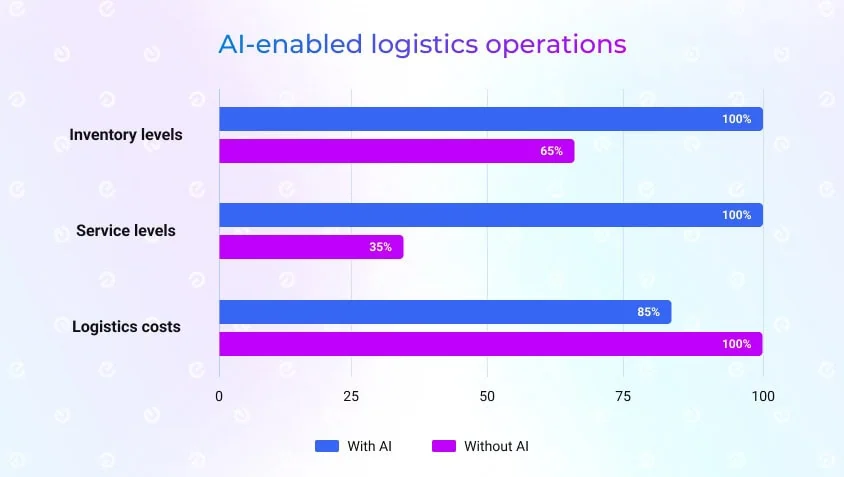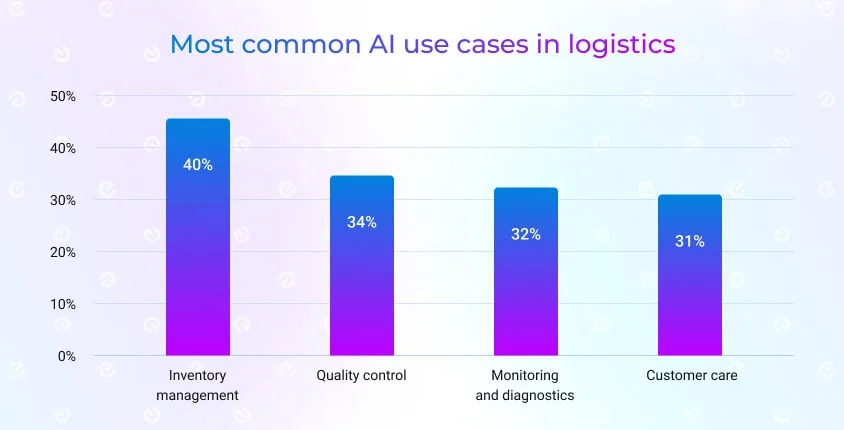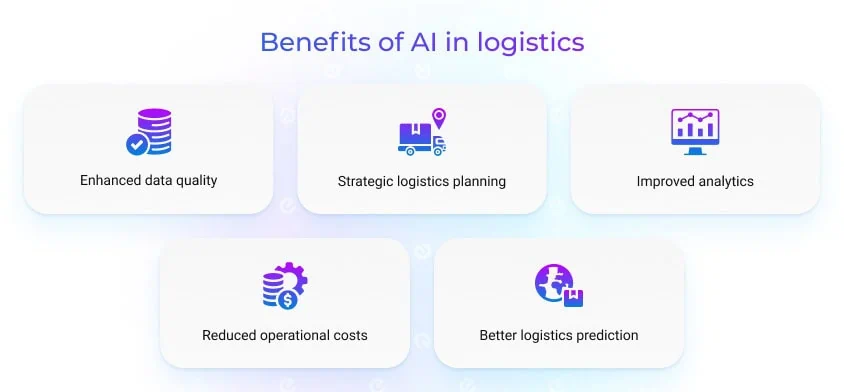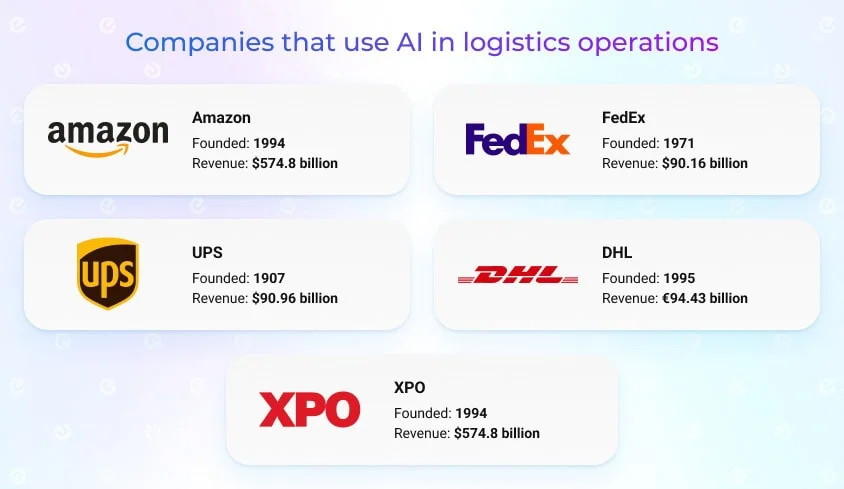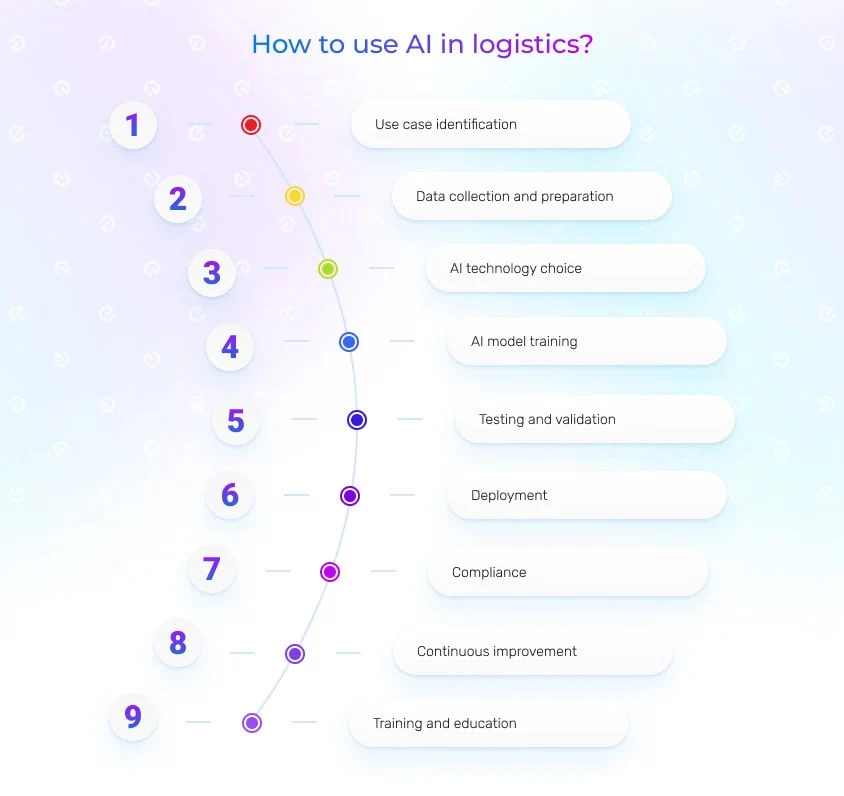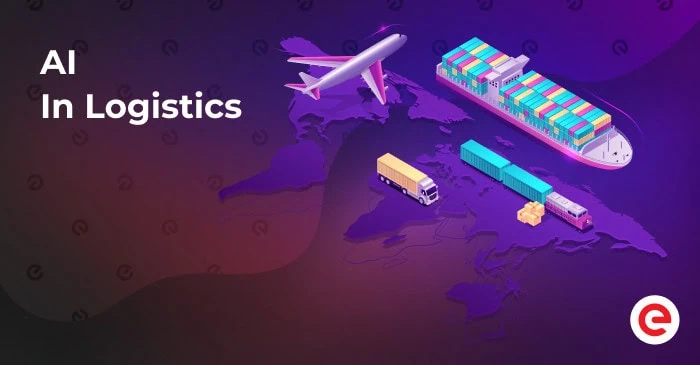
Updated: July 4, 2024
Published: May 27, 2024
What is the special bond between logistics and artificial intelligence? How has this industry become among the first ones to leverage AI capabilities? In this article, we’ll discover the transformative impact of AI in logistics and how companies can use this technology to their advantage.
List of the Content
- What is the role of AI in logistics?
- AI use cases in logistics
- Benefits of AI in logistics
- AI in logistics examples
- How to use AI in logistics?
- What is the future of AI in logistics?
- Conclusion
WHAT IS THE ROLE OF AI IN LOGISTICS?
The top priority is that AI in logistics is not just a concept for the future; it is already being actively implemented and transforming the industry today. Many logistics companies are using AI technologies to optimize various aspects of their operations and feel a significant impact.
AI-based solutions are now readily available to help companies enhance their logistics management performance. They have access to a wide variety of functionalities, including integrated network planning, dynamic workflow automation, predictive capabilities, end-to-end transparency, demand forecasting, etc.
Sophisticated AI models help organizations understand logistics operations’ effects, causes, and challenges better. Teams that have already utilized AI empathize with the significant improvements in logistics costs, service, and inventory levels. According to McKinsey & Company, the organizations can reduce costs by 15%, lower inventory levels by 35%, and increase service levels by 65% compared to competitors that aren’t using AI in logistics.
Therefore, the role of AI in logistics encompasses many areas and allows teams to enhance accuracy, efficiency, and productivity within their operations. Logistics companies use these opportunities to embrace different needs and make the most of AI adoption.
- AI’s predictive capabilities enable companies to anticipate demand, optimize inventory levels, and reduce wastage. Artificial intelligence logistics can forecast future demands with high accuracy, allowing companies to plan their processes more effectively.
- AI-based network planning identifies the most reasonable routes and modes of transportation, reducing costs and improving delivery times. The innovative approaches minimize disruptions and ensure a seamless flow of goods.
- Automated systems equipped with AI can manage inventory, predict shortages, and optimize storage space. Robotics and AI algorithms facilitate faster and more accurate picking and packing processes, reducing human error and increasing throughput.
- Artificial intelligence can also predict maintenance needs for warehouse equipment, preventing unexpected downtime and maintaining operational efficiency.
- With dynamically adjusted routes in response to real-time data, AI helps logistics companies maintain high service levels and improve customer satisfaction.
- AI works great for streamlining administrative tasks such as invoicing, payroll, and customer service. AI-driven chatbots can handle customer inquiries, process orders, and provide real-time updates on shipment status.
- By automating routine tasks, AI allows businesses to engage more in strategic activities, enhancing overall operational efficiency.
The role of AI is based on driving advancements across areas of different specialization in the logistics domain. Companies favor opportunities to achieve greater efficiency, reduce costs, and improve service quality, positioning themselves for success in an increasingly competitive market.
New technology solutions definitely help handle the complexities of modern logistics operations. The point is that companies have to be ready to make some effort to deliver intelligently designed logistics systems tailored to specific business needs. The AI strategy alignment allows them to address key decision-making points with appropriate insights and avoid unnecessary complications. It can demand significant time and investments in both technology and personnel but makes it vital to undergo the AI adoption right.
AI USE CASES IN LOGISTICS
AI logistics is a rapidly evolving field that holds great potential to transform the way logistics and supply chain operations are managed and executed. In recent years, the industry has experienced significant changes due to disruptive forces and advancements in technology. Artificial intelligence, with its capacity to analyze extensive data sets, make informed decisions, and forecast results, has emerged as a crucial asset in the logistics industry.
According to statistics, the most common use cases embrace the following areas in logistics.
Inventory management
AI is used for inventory management in logistics by predicting demand, optimizing stock levels, and automating replenishment processes, leading to reduced costs and improved efficiency. AI-driven systems can also optimize inventory levels by considering factors like seasonality, lead times, and supplier performance, ensuring the right amount of stock is always maintained. Moreover, AI can automate replenishment by generating purchase orders or triggering production based on real-time inventory levels and demand forecasts. The automation reduces human errors and saves time, resulting in smoother operations and cost savings for logistics companies.
Quality control
AI is leveraged to automate inspections, identify anomalies, and improve overall quality management processes. AI-powered analytics can be used to assess overall product quality with analyzing data from various sources, such as production processes, transportation conditions, and customer feedback. By correlating this data, it can identify patterns and insights that help improve product quality and reduce the likelihood of defects or recalls. These advanced approaches help prevent breakdowns and reduce downtime, ensuring smooth operations and minimizing disruptions in the supply chain. Logistics companies receive additional tools to enhance operational efficiency, improve product quality, and deliver better customer service.
Monitoring and diagnostics
Artificial intelligence has also become an efficient tool for monitoring and diagnosing various logistics operations. It is involved in analyzing vast amounts of data from sensors, GPS, and other sources to predict and prevent potential issues. Teams get additional means to optimize routes, predict maintenance needs, and improve overall efficiency and reliability. It plays a crucial role in improving fleet management, enhancing safety, and ensuring timely delivery of goods. It can also monitor driver behavior to provide real-time alerts for unsafe driving practices, helping to prevent accidents and improve road safety.
Customer care
Applying AI in customer care is an excellent practice to improve response times, provide personalized support, and optimize workflows. It can analyze customer inquiries, offer automated responses, and escalate complex issues to human agents. Besides, AI-powered chatbots can handle common queries, freeing up human agents for more complicated tasks. AI can also help track shipments, provide real-time updates for customers, predict potential delivery issues, and enhance overall customer satisfaction. This technology enables logistics companies to gather insights from customer interactions, helping them identify trends, improve service offerings, and tailor marketing strategies to meet customer needs more effectively.
Logistics businesses prioritize innovating their operations to maximize physical assets and infrastructure use. It includes implementing robust digital systems for inventory management, order processing, shipment tracking, real-time data analysis, and decision-making with AI. Investing in the latest technology solutions allows them to streamline operational processes, improve efficiency, and enhance customer satisfaction, leading to greater profitability and market success.
How can your business use artificial intelligence in logistics?
Apply for professional consultation with our AI specialists to deliver advanced tech solutions powered by AI according to your needs.
BENEFITS OF AI IN LOGISTICS
AI is reshaping the logistics industry by revolutionizing how companies manage their operations and processes. Advanced technology solutions enable businesses to operate more efficiently in an increasingly complex and competitive environment.
By choosing the power of AI, companies adopt improved ways to streamline logistics operations, enhance customer service, and achieve business growth. AI has shown remarkable innovation in enhancing efficiency across various aspects of logistics. So, let’s focus on the distinct advantages to gain with AI for logistics.
Enhanced data quality
That is an excellent benefit of using AI in logistics to enrich data quality. AI technologies like NLP and ML assist in handling vast amounts of data with greater accuracy and speed than traditional methods. Logistics companies recognize the importance of improving data processing capabilities. Moreover, artificial intelligence algorithms can identify patterns and integrate data from different sources to provide a comprehensive and unified view of logistics operations within your organization.
Strategic logistics planning
Incorporating AI into strategic logistics planning transforms the traditional approach into a smart, efficient, and responsive network capable of adapting to changing market dynamics and customer demands. It boosts operational efficiency and provides a strategic advantage in the competitive logistics landscape. AI supports long-term planning by providing comprehensive insights into market trends, customer behavior, and emerging technologies. That allows companies to develop robust logistics strategies that align with their business objectives and market demands. AI-driven forecasting helps logistics managers plan for future scenarios, ensuring their strategies are resilient and adaptable to various potential challenges.
Improved analytics
AI for logistics enhances analytics by processing large volumes of data in real time, enabling extensive analytics for demand forecasting, optimizing delivery routes, and managing risks more effectively. It leads to improved decision-making, reduced operational costs, and more efficient supply chain management. Additionally, AI helps to identify patterns and trends that might be overlooked by human analysis, automate routine tasks, and provide actionable insights for continuous improvement. By leveraging AI, logistics companies can enhance their responsiveness to market changes, improve customer satisfaction, and maintain a competitive edge.
Reduced operational costs
Artificial intelligence reduces operational costs through optimizing routes, improving inventory management, automating repetitive tasks, and enhancing demand forecasting. It supports lower fuel consumption, decreased labor expenses, minimized stockouts and overstock situations, and increased efficiency. This adoption can improve predictive maintenance of vehicles and equipment, reducing downtime and repair costs. Advanced analytics provided by AI help identify inefficiencies and areas for cost savings, allowing for more informed decision-making and strategic planning. Furthermore, AI-driven systems can enhance supply chain visibility, ensuring real-time tracking of goods, which reduces the risk of delays and loss. By streamlining warehouse operations through robotics and automation, AI minimizes manual errors and accelerates processing times, further contributing to cost reductions.
Better logistics prediction
Artificial intelligence algorithms analyze historical data and current trends to forecast future demand, inventory needs, and potential disruptions. This predictive capability helps companies proactively anticipate changes and adjust their logistics plans, reducing the risk of stockouts or overstocking. AI optimizes resource allocation, such as labor and equipment, by predicting workload variations and scheduling accordingly. AI systems can scale operations up or down based on demand fluctuations without compromising efficiency. This flexibility is crucial for businesses dealing with seasonal variations or sudden market changes, ensuring they can respond swiftly and effectively.
AI IN LOGISTICS EXAMPLES
Artificial intelligence has become integral to optimizing logistics and supply chain operations, with numerous companies leveraging its capabilities to achieve substantial efficiencies and cost reductions. A recent survey reveals that 54% of businesses of various sizes have successfully integrated AI into their operational processes. Some leading companies at the forefront of this transformation can turn into good examples of AI in logistics.
Amazon
Known for its sophisticated logistics operations, Amazon uses AI to optimize its supply chain, manage inventory, and improve delivery routes. Their AI-powered robots in warehouses enhance picking and packing efficiency. Artificial intelligence algorithms help inventory management, reduce delivery times, and improve efficiency. Additionally, machine learning models analyze vast amounts of data to forecast demand, optimize stock levels, and determine the fastest shipping routes, ensuring timely and cost-effective delivery.
FedEx
FedEx’s strategy for AI focuses on developing a unified data platform that consolidates real-time information from its worldwide network. Leveraging AI and machine learning to analyze extensive data sets, the company seeks to improve supply chain transparency, boost predictability, and introduce innovative customer-facing solutions that offer instant benefits. Their AI-driven systems dynamically optimize delivery routes based on real-time traffic data, weather conditions, and other variables to ensure timely deliveries. Also, they have leveraged AI-powered sorting systems in their hubs to streamline the handling of packages, increasing throughput and reducing errors.
UPS
The United Parcel Service employs AI for route optimization through its ORION (On-Road Integrated Optimization and Navigation) system, which helps reduce fuel consumption and improve delivery times. This sophisticated navigational tool leverages complex algorithms and machine learning to dynamically optimize delivery routes in real time, considering numerous variables and constraints. ORION reduces mileage, significantly cuts fuel consumption, decreases carbon emissions, and enhances delivery precision, bolstering UPS’s logistics operations efficiency.
DHL
This global logistics company uses AI for various applications, including predictive maintenance, warehouse automation, and real-time analytics for better decision-making. They leverage artificial intelligence capabilities to optimize delivery routes, predict shipment delays, and manage warehouse inventory. It also supports customer service through chatbots and improves supply chain visibility with predictive analytics. These approaches enable DHL to provide faster, more reliable, cost-effective services. Besides, AI-driven automation in DHL’s warehouses includes robotic arms for sorting and packing and drones for inventory management.
XPO Logistics
XPO leverages AI across various facets of its logistics operations to enhance efficiency and decision-making. The company is well-positioned to offer a competitive advantage to its clients by improving efficiencies, boosting safety and sustainability, and elevating the overall customer experience. It focuses on collectively transforming its operations with the help of artificial intelligence capabilities and making a transition into a new, technology-driven era of logistics. AI helps optimize delivery routes by analyzing traffic patterns and weather conditions, predicts equipment maintenance needs to minimize downtime, and manages warehouse inventory in real time to reduce storage costs. Additionally, AI-powered chatbots and virtual assistants handle customer inquiries, provide real-time shipment tracking, and improve customer satisfaction.
These examples of AI in logistics by known companies highlight the diverse and innovative ways they are leveraging AI to revolutionize their logistics operations, drive efficiency, and enhance customer experiences.
HOW TO USE AI IN LOGISTICS
Artificial intelligence is a game-changer in the logistics industry. It demands meticulous planning, technological investments, and seamless system integration. The potential benefits, including cost savings, efficiency enhancements, and improved customer satisfaction, make AI compelling investments for numerous companies.
For logistics businesses, the key lies in finding efficient ways to delve deep into data and processes. This analysis is pivotal in pinpointing areas where AI can deliver the most value and offer innovative solutions within logistics operations. The AI implementation process typically involves the following steps.
- Use case identification: The team has to start with determining which areas of their logistics operations can benefit most from AI, such as route optimization, demand forecasting, warehouse management, supply chain visibility, etc.
- Data collection and preparation: Relevant data from various sources, including sensors, IoT devices, ERP systems, and historical records, has been gathered to prepare for cleaning and preprocessing the data to make it suitable for AI algorithms.
- AI technology choice: The next step goes with selecting the right AI-powered technologies based on your use cases and data. It can include machine learning, deep learning, natural language processing, computer vision, etc.
- AI model training: This is an essential stage for developing and training AI models using the prepared data. It may involve both building custom models or using pre-built models and adapting them to your specific needs.
- Integration: It is vital to seamlessly integrate the trained AI models into your existing logistics systems and workflows. The decisive aspect is to ensure compatibility and smooth communication between AI systems and other company’s software.
- Testing and validation: AI specialists take responsibility for thoroughly testing the AI models in a controlled environment to ensure they perform as expected and validate the results against real-world scenarios.
- Deployment: Once the AI models are validated, the team is ready to deploy them into your production environment. They continuously monitor performance and make adjustments when required.
- Compliance: It becomes evident that any AI system has to comply with relevant regulations and ethical standards, especially regarding data privacy and security. Your AI-powered system needs to adhere to data privacy laws like GDPR, follow robust cybersecurity measures, maintain transparency in AI decision-making processes, and regularly update to meet industry standards.
- Continuous improvement: AI models should be carefully monitored and updated to improve their accuracy and efficiency over time. Gathering feedback and incorporating outlined insights into the AI development process is a good practice.
- Training and education: Last but not least, it is necessary to provide training and education for your staff to understand and use AI tools effectively in their roles within the logistics company. Prioritizing employee training to maximize the benefits of AI tools makes it easier to foster a culture of innovation and adaptability.
Streamlining AI implementation in logistics can significantly advance business operations and provide a competitive edge in a market. Investing in AI technology also enables better handling of large data sets, providing deeper insights and fostering innovation within the logistics sector.
WHAT IS THE FUTURE OF AI IN LOGISTICS?
As AI solutions advance, they play a crucial role in shaping an AI-enhanced logistics environment. Well-arranged operational processes benefit businesses and customers, providing enhanced efficiency, precision, and customer service. Logistics experts can anticipate a future where artificial intelligence seamlessly integrates into most business operations.
The industry has successfully experienced significant transformation in recent years, driven by various market changes and the advent of new technologies. Artificial intelligence in logistics has all the required means to revolutionize how companies manage and optimize their workflows. Its high capacity to process vast amounts of data, make intelligent decisions, and predict outcomes has established it as an indispensable tool in the logistics sector. This technology is projected to be the most implemented in the following years and is commonly considered an influential and transformative factor.
Logistics professionals recognize the industry’s significant impact, leading to advancements in efficiency, processes, and business dynamics. AI in logistics has achieved wider recognition and raised awareness and acceptance of its role in reshaping businesses. Underscoring such advancements’ importance helps support sustainable growth and business competitiveness.
However, many companies face difficulties in fully leveraging AI’s potential. The critical thing to realize is that technology alone can’t solve all logistics issues. Some teams abandon decisive factors like the overall digital transformation. Digital transformation is a key to shifting a company’s mindset and behavior. Digital transformation embraces core components to implement AI in logistics efficiently. It covers such aspects as the right blend of technology, required digital talent, and adapted processes and business models.
Companies need digital transformation to capitalize on AI’s potential. They have an opportunity to shift their focus from retrospective analysis to forward-looking strategies, utilizing real-time and predictive insights. It’s worth the effort to process reliable data and get accurate insights to make instant decisions and execute them effectively.
What is the role of the digital transformation framework in business evolution?
Find the comprehensive guide on adopting structured approaches to integrate the latest technologies into all your business areas.
Additionally, companies have to be ready to invest in continuous learning and upskilling programs to help their workforce keep pace with technological innovations. The agile company’s culture encourages experimentation and quick adaptation to new tools and methods. Collaboration between different departments, such as IT, operations, and strategy, is also essential to foster more integrated approaches to digital transformation and the adoption of new technologies like AI.
Moreover, organizations should consider partnerships with AI technology and development service providers to accelerate their digital initiatives and gain access to cutting-edge solutions. Implementing robust cybersecurity measures is another critical aspect, as the increased reliance on digital systems and data makes companies more vulnerable to cyber threats. By addressing these multifaceted challenges, companies can create a sustainable framework for leveraging AI in logistic operations and achieving impressive results.
CONCLUSION
The logistics industry is poised for significant transformation with the continuous advancements in AI-powered technology solutions. They offer innovative approaches that can revolutionize business operations and service delivery. AI logistics use cases span a broad spectrum, from efficient data integration and scalability to predictive analytics and improved decision-making. Expedited deliveries, reduced errors, and optimized resource utilization contribute to heightened customer satisfaction and a competitive edge.
Are you looking to elevate your logistics with cutting-edge software solutions?
Partner with Existek, a professional development service provider, to bring your ideas into AI-powered software. Contact the team to start the consultation.
Frequently asked questions
What is the role of AI in logistics?
AI's importance lies in its ability to drive innovation, improve operational performance, and meet the evolving demands of the logistics industry. This technology adoption also enables logistics businesses to fulfill rising market conditions and customer preferences quickly and efficiently.
What are the most promising AI logistics use cases?
The common AI use cases include route optimization to reduce travel time and fuel costs, demand forecasting to improve inventory management, predictive maintenance for vehicles and equipment to minimize downtime, real-time tracking and visibility of shipments for enhanced transparency, and warehouse automation for improved efficiency and reduced labor costs.
What is the impact of AI on logistics operations?
AI contributes significantly to more efficient, reliable, and safer logistics operations. It can positively impact areas such as optimizing route planning, improving inventory management, predicting demand, and automating routine tasks.
What is the future of AI in logistics?
Artificial intelligence shapes the bright future in logistics, with supported efficiency through automation, predictive analytics, and real-time data processing. The technology has already optimized supply chain management, reduced operational costs, improved delivery accuracy, and enabled dynamic route planning. Additionally, AI-driven innovations in robotics and autonomous vehicles will further revolutionize the logistics industry.

